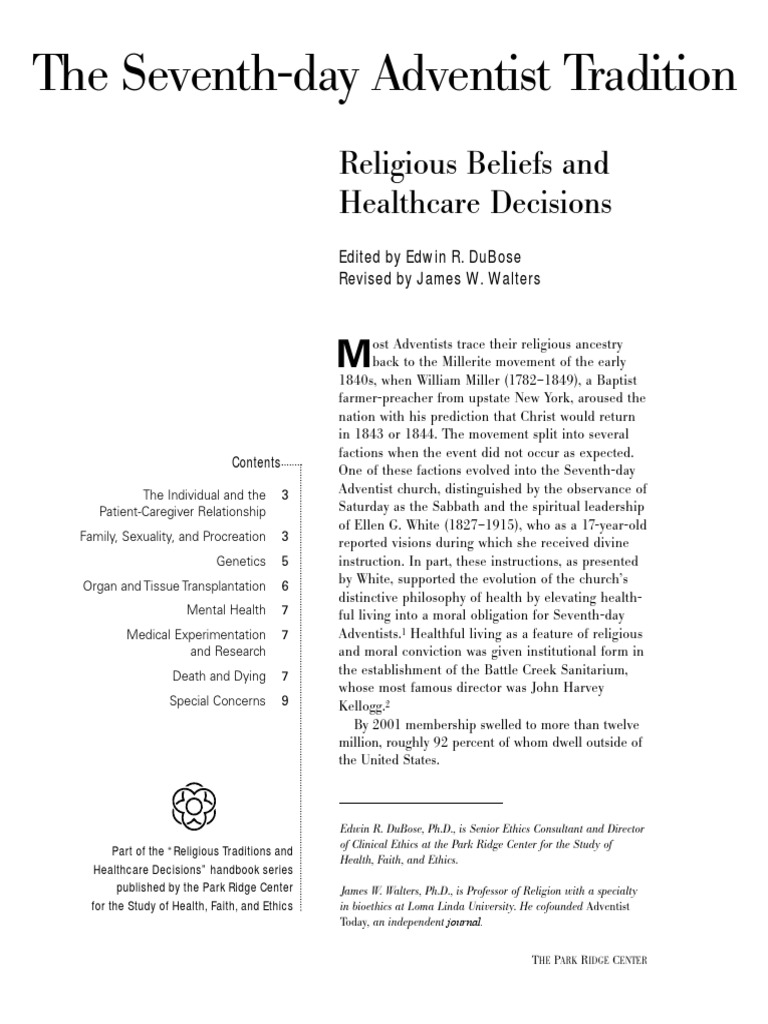Understanding the Seventh-Day Adventist Church entails delving into its origins, beliefs, and distinct practices, particularly as they stand in contrast to other Christian denominations. Adventism burgeoned during the 19th century in the United States, emerging out of the Millerite movement around the time of the Second Great Awakening. Rooted in a fundamental belief in the imminent return of Jesus Christ, the church has developed a unique theological identity that warrants exploration.
The Seventh-Day Adventist Church, formed officially in 1863, is characterized by its particular observance of the Sabbath. Unlike most Christian denominations that celebrate Sunday as the day of worship, Adventists observe the Sabbath from Friday sunset to Saturday sunset, emphasizing the importance of rest and spiritual rejuvenation as instituted in the Fourth Commandment. This practice is not merely ritualistic; it demonstrates a conviction that adherence to God’s commandments is essential for spiritual integrity. This salient distinction immediately sets Adventists apart from mainstream Christianity.
Another cornerstone of Seventh-Day Adventist belief is the concept of the “Investigative Judgment.” This doctrine posits that Christ, following His ascension, entered into a heavenly phase of ministry where He examines the lives of believers. This belief directly influences the Adventist understanding of salvation and judgment, diverging sharply from the more traditional Christian tenets that emphasize grace and faith through Jesus Christ alone. The Investigative Judgment, believed to have commenced in 1844, serves as a reminder of the importance of living a life consistent with biblical teachings.
The prophetic interpretations within Adventism are primarily anchored in the writings of Ellen G. White, one of the founders of the church. Her prolific output includes visions and guidance on spiritual matters, health, and education, and she is regarded as a prophetess by adherents. Many Christian groups look to the Bible as the sole source of divine revelation. In contrast, Seventh-Day Adventists embrace the Bible along with the inspired writings of White as central to their faith, leading to their distinctive theological positions.
Health principles form another defining aspect of Adventist life. The church advocates for a holistic approach to health, strongly encouraging a vegetarian diet, abstinence from alcohol and tobacco, and an overall lifestyle that promotes physical, mental, and spiritual well-being. This health message aligns with their belief in the inherent connection between the body and spirit, highlighting a commitment to a balanced lifestyle that other Christian denominations may not emphasize as rigorously. This emphasis on health extends to a network of medical institutions, educational facilities, and wellness programs that embody the church’s holistic philosophy.
The Adventist Church takes a proactive stance on social justice, community service, and humanitarian efforts. They view service as a manifestation of faith, attempting to mirror Christ’s love through active engagement in the world. This commitment to service distinguishes Adventism from some groups that may prioritize doctrinal correctness over social action. The church supports numerous initiatives aimed at alleviating poverty, improving education, and enhancing health care in underserved populations worldwide. This drive to effect positive change is reflected in the church’s motto: “To make man whole.”
Moreover, eschatology—the study of end times—occupies a significant place in Adventist theology. The church teaches a premillennial, premillennialist view, whereby believers anticipate a literal second coming of Christ that will usher in a 1,000-year reign, known as the millennium. This emphasis on prophecy and the fulfillment of biblical predictions undergirds much of their mission work and evangelism. While many Christian groups share an interest in eschatology, the distinct interpretations and ramifications found within Adventist teachings are pivotal for their identity.
In terms of governance, the church operates with a unique organizational structure that relies heavily on both local and global church leadership. Regional conferences often hold authority over local congregations, promoting a sense of unity and coherence throughout the global church. This contrasts with more hierarchical structures observed in many traditional Christian denominations, which may concentrate power within a central authority, such as a bishopric or papacy.
In recent decades, discussions on gender roles within the church have arisen. While many Christian denominations are embracing more egalitarian principles regarding women’s roles, Seventh-Day Adventists continue to grapple with this issue. The ordination of women is a contentious topic, with different views within the global church, illustrating an ongoing dialogue about inclusivity and equality in ministry. Notably, the church has recognized the importance of women in leadership, even as debates linger on formal ordination practices.
The Seventh-Day Adventist Church persists as a distinctive entity within the broader Christian landscape, representing a unique amalgamation of beliefs and practices. Their commitment to the Sabbath, healthful living, social justice, and the prophetic tradition carve out a niche that appeals to many seeking a holistic and theologically rich Christian experience. By understanding these differences, one gains a clearer picture of how Adventism contributes to the tapestry of 21st-century Christianity, advocating for a faith that is both living and applicable in the modern world.



